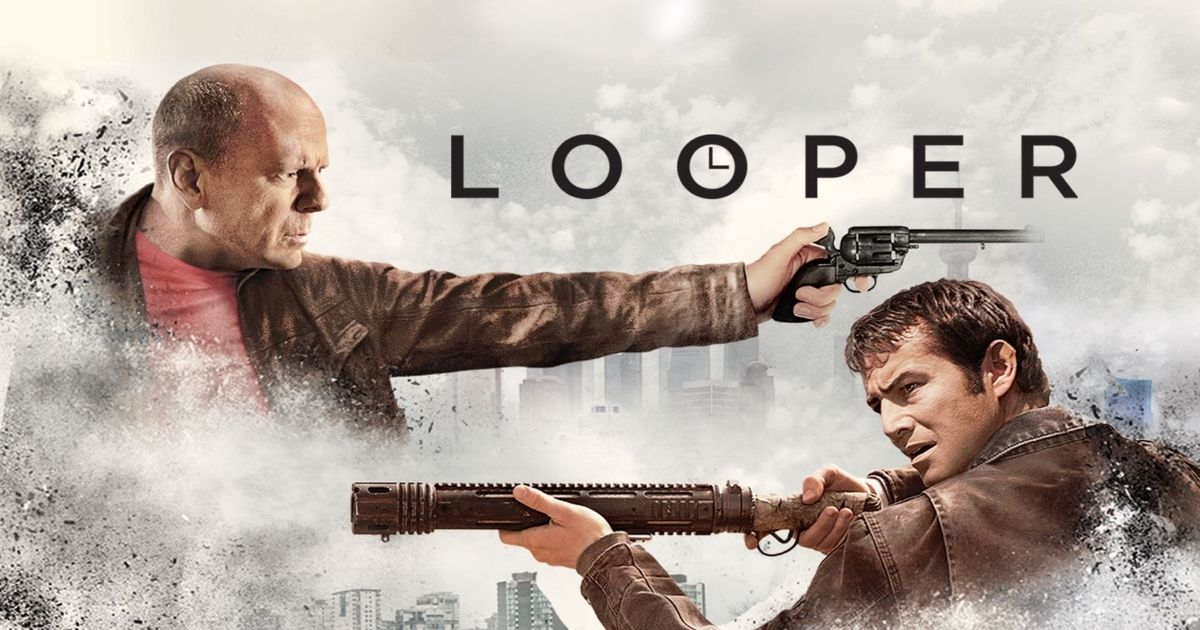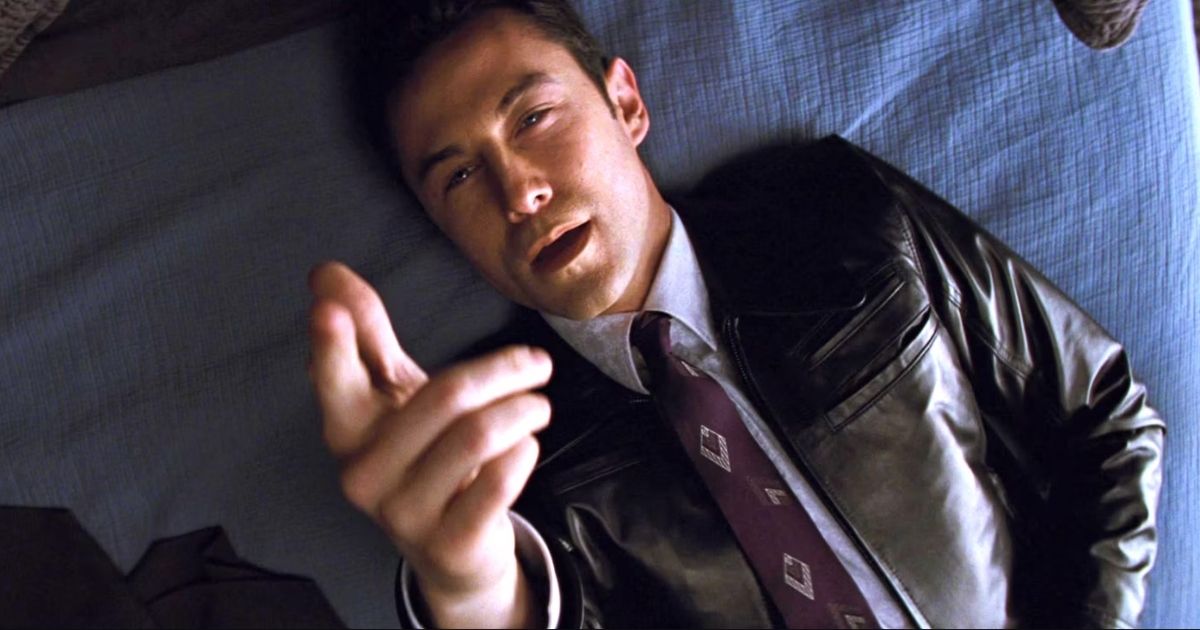Over the last decade, Rian Johnson has become one of the most talked-about directors in Hollywood. He’s a filmmaker known for his unique style and desire to subvert audience expectations. He keeps viewers guessing and delivers stories with momentum, substance and plenty of humor along the way. After directing some of the most praised episodes of Breaking Bad, his take on Star Wars with The Last Jedi in 2017 (as divisive as it was) made him a household name, and his place as a must-watch director was cemented with 2019’s Knives Out. His next film, a Knives Out sequel titled Glass Onion, is set for release this December. However, the first film to really break the director into the mainstream conversation, Looper, is celebrating its tenth anniversary of release at the end of September.
Looper is one of the most memorable, distinctive and creative science fiction films of the early 2010s. Johnson tells a time travel story unlike any other. Set in the near future of 2044, the film follows a “looper” named Joe, who is essentially an executioner hired to kill and dispose of people sent back in time by the criminal leaders of 2074. The cast of the film is outstanding, as Joseph Gordon-Levitt and Bruce Willis play the same character at different ages, with the rest of the film populated by the likes of Emily Blunt, Jeff Daniels and Paul Dano. Looper was a hit at the time of its release, as it made just over $175 million globally with a production budget of only $30 million. It was praised by critics and audiences alike, with some calling it one of the best films of 2012. A decade later, Looper still holds up remarkably well. As, in an age of blockbuster IPs and franchise revivals, the film stands tall as an exhilarating original story.
Avoiding the Complexities of Time Travel
Time travel movies are a dime a dozen, as so many different interpretations of the concept are released every year, with recent examples ranging from Avengers: Endgame to The Adam Project and The Tomorrow War. What makes Looper stand out from the pack, though, is that, for a movie whose concept revolves around time travel so thoroughly, the film does not act as a time travel story. It uses the concept as a tool to establish its plot, but the actual story of Looper is much more character-driven than similar sci-fi films typically are. Time travel is often an overly convenient plot device. But in Looper, Johnson is able to utilize the concept without falling into the usual pit traps that it opens up. He does this by setting the primary plot of the film in a time when the technology has yet to be invented. The time travel elements of the film come exclusively from the future of 2074, which is only seen through narrative flashbacks. All of the film’s central action takes place in 2044, with only a couple of characters being from the future.
Johnson uses the concept of time travel to tell a compelling sci-fi story without relying on it for all the film’s major twists and turns. As the 2074 mafia sends people back in time unwillingly, the people of 2044 are only there to clean up their mess. They are restricted by the technology of their time, and therefore cannot travel forward or backward in time as they choose. Johnson uses this definition of time travel to lay the groundwork for Looper’s story. By keeping the technology out of the reach of the film’s characters, he avoids all of the story complications that often result from the concept. The film’s story and characters are stuck where and when they are, and the only thing that they can change is what they do in the moment.
The Past Vs The Future
Looper is the story of a man at war with himself. As a looper, Joe eventually will be forced to “close his loop,” meaning that his 2074 self will be sent back in time for his 2044 self to unknowingly execute. Once that is done, the younger Joe will have thirty years to go off and live as happy a life as he can. That’s exactly what he did. The older Joe in the story, played by Willis, fell in love with a woman who he believes made him a better man. They were happy together and Joe was finally able to find some peace through his wife. But when his time was up, his wife was killed in the crossfire as his former employer came to collect. Joe then kills the men who were sent for him and travels back in time of his own accord. He believes that by going back to 2044, he can kill the leader of the criminal organization as a child, stopping them from coming to retrieve him in 2074 and thereby saving his wife’s life.
The younger Joe from 2044, played by Gordon-Levitt, is at a point where he is ready to begin the next 30 years of peace in his life. However, when 2074 Joe escapes the bullet from his younger self, everything is put at risk. There is now a target on both of their backs. So, on one hand, the older Joe traveled back in time in an attempt to save and maintain the happy life he lived, but the younger Joe needs to kill his future self if he has any hope of staying alive and getting to live that happy life. It’s the compulsions of the same man, 30 years apart, being pitted against each other. The younger Joe’s hope for his future and the older Joe’s sentiment for his past are set in opposition to one another, with only one of them able to stay or become reality.
A large part of why Looper works is because of this core duality. Even though the story is told from the perspective of the 2044 Joe, both variations of the character are given their due. The audience understands and empathizes with both characters and the direness of their situations. The older and the younger Joe have been driven into this situation by the oppressive criminals they worked for. They are forced to confront the possibilities of their past and future, and in doing so they must come to terms with their own definitions of happiness and the extent to which they’ll go to achieve it.
A Question of Agency and Predisposition
These are two men of the same being, and the conflict between them raises an interesting question of the control they have over their lives. Is it one shared life between the two of them? Or are they allowed to make different decisions that will lead to different results? From the perspective of the 2074 Joe, he believes that if he kills the child who is eventually responsible for his misfortune, then that misfortune will never occur. He will return to his happy life with his wife, and the two of them will live out the rest of their days together. However, by merely interacting with his younger self, he threatens to alter the course of his life. The memory of his wife becomes less clear, as the chances of 2044 Joe meeting and falling in love with her become slimmer and slimmer as 2074 changes the course of his life.
This puts 2044 Joe in a situation in which he must make a decision whether to continue down the road traveled by the 2074 Joe or to go in his own direction and alter everything. He doesn’t know if he has the agency over his life to alter the future in that way, but he fears that if he were to make a different decision, then the happy life he dreams of may never come to fruition. There’s also the added complication of his newfound relationship with Sara (Emily Blunt) and her son Cid. Cid is the child who is in 2074 Joe’s crosshairs, and 2044 Joe means to stop Joe from killing Cid and changing everything. He believes Cid is a good kid and, with a positive childhood, he could grow into a good person. Ultimately, the younger Joe recognizes that the destructive rage of his future self is causing irreversible trauma in Cid’s life. His mother is threatened, his home is attacked, and Cid lashes out in increasingly violent and supernatural ways. Ultimately, by deciding to take his own life, 2044 Joe puts a stop to the trauma. His future self disappears, and Cid and Sara are left to live their lives. Through this act, Joe took control of his future. In doing so, he likely altered the lives of many. He believed that Cid having his mother, Sara, there to raise him would stop him from becoming the violent criminal he was in 2074. By taking his life, 2044 Joe stopped his future self, saved Cid and his mother, and spared the world the pain of such an incredibly evil and powerful individual. In doing so, he also likely saved the life of his future wife, even if he wasn’t there to live it with her.
With Looper, Rian Johnson tells a story of love, pain, and desperation, with a heavy science-fiction wrapping that covers the whole thing. His script is never stale or predictable, and the ending delivers an emotional gut punch that ties the entire film together. The story is full of clever twists that only become progressively more jaw-dropping as the story progresses. Looper set the stage for what to expect from a Rian Johnson film. These kinds of unexpected alterations in the story have become a defining trait of Johnson’s filmography. Looper is a film that has only become more enjoyable with time. It’s not just one of Johnson’s best, but it’s also one of the best science-fiction films the 2010s have to offer.




